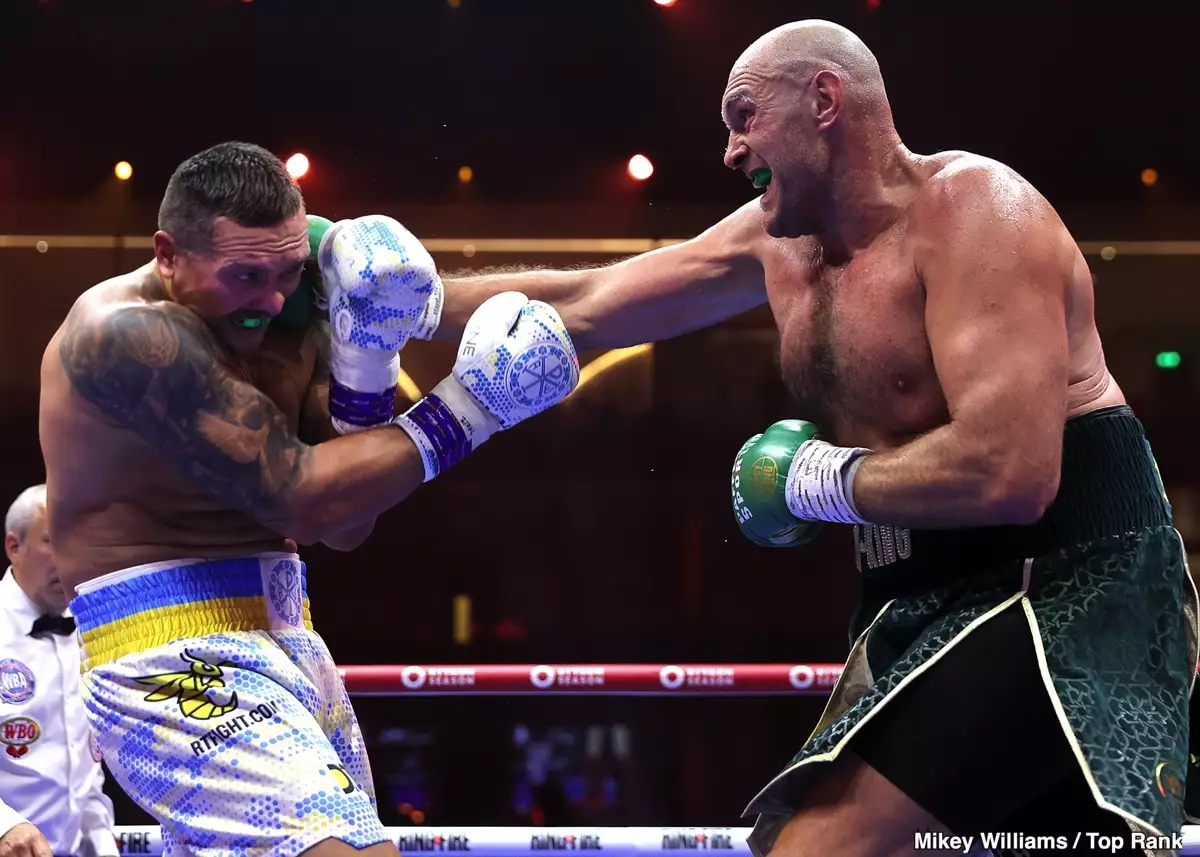As Tyson Fury prepares for his rematch against Oleksandr Usyk on December 21st, the anticipation surrounding this encounter is palpable. Fury’s coach, Andy Lee, is confident that they will secure a knockout victory this time around. Lee highlights improvements in Fury’s physical fitness, crediting planned sparring sessions that were previously sidelined due to concerns over a recent cut. However, while Lee’s optimism is evident, a critical examination of both fighters’ resumes and capabilities reveals a more complex narrative unfolding.
At 36 years old, Tyson Fury (34-1-1, 24 KOs) is often proposed to be among the greatest heavyweights in boxing history. Lee shares this sentiment, suggesting that losing to Usyk does not diminish Fury’s standing in the sport. Yet, when scrutinizing Fury’s resume, the argument for him being one of the “best ever” appears less convincing. The opponents Fury has faced in rematches—Deontay Wilder, John McDermott, and Derek Chisora—while notable, do not represent the same caliber as Usyk, who is celebrated for his skill and tactical prowess.
It’s crucial to address the notion that Fury’s previous victories over fighters like Wilder were not indicative of facing elite talent. Wilder’s championship reign was marked by minimal competition, and many boxing analysts suggest that Fury’s success has been facilitated more by management strategies than raw skill. This narrative paints Fury not just as a fighter, but as a product of boxing’s promotional machinery.
Lee posits that the absence of sparring before the prior bout against Usyk will be rectified this time, allowing Fury to enter the ring fitter and sharper than ever. He emphasizes that the key to victory lies in being more conditioned and engaged in rigorous training. However, the problems Fury faced during their last encounter were not solely the result of a lack of fitness. His vulnerability to being hurt—which became evident in the ninth round—is arguably a more significant factor tied to his physicality and technical skill set.
While training camp dynamics, such as improved fitness, can undoubtedly enhance performance, a revitalized Fury must confront deeper issues of punch resistance and tactics. Simply improving physical condition may not suffice if he cannot address these underlying technical challenges. Acknowledging if these adjustments will lead to the desired outcome remains uncertain.
The pressure on Fury extends beyond personal performance; it reverberates through the landscape of heavyweight boxing. A loss to Usyk may hinder the much-anticipated clash with Anthony Joshua next year, altering its promotional value and turning what should be a celebratory contest into a battle of fighters looking to reclaim their prestige. Lee’s assertion that Fury does not feel the weight of this pressure is contestable—losing to Usyk carries significant implications, tarnishing legacy and marketability alike.
Furthermore, boxing fans often assess greatness through victories over top-tier contenders, and any loss against Usyk could cause a ripple effect regarding Fury’s standing in the eyes of the public. The nuances of legacy in boxing are shaped by perceptions, and any doubts cast upon a fighter’s mettle can echo through history.
In Lee’s eyes, both Fury and Usyk occupy lofty positions in the hierarchy of heavyweight boxing. Yet, this analysis raises questions. Fans and analysts alike recognize that accolades depend not just on the fighter’s claims but also on who they have faced and defeated. As Fury heads into this critical rematch, he must not only fight against Usyk but also against skepticism surrounding his legacy.
As the countdown to the rematch begins, Tyson Fury finds himself at a crossroads—a victory could serve to solidify his claims while a loss risks unraveling the fabric of his boxing narrative. In this high-stakes environment, Fury’s response will determine not only the fate of the upcoming rematch but also the essence of his career moving forward. The stakes are not just for titles, but for the very perception of greatness in the world of heavyweight boxing.

